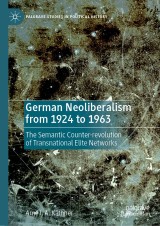Details
German Neoliberalism from 1924 to 1963
The Semantic Counter-revolution of Transnational Elite NetworksPalgrave Studies in Political History
|
128,39 € |
|
| Verlag: | Palgrave Macmillan |
| Format: | |
| Veröffentl.: | 18.09.2024 |
| ISBN/EAN: | 9783031654671 |
| Sprache: | englisch |
| Anzahl Seiten: | 300 |
Dieses eBook enthält ein Wasserzeichen.
Beschreibungen
<p>This book offers an in-depth study of German neoliberalism between 1924 and 1963, arguing that a neoliberal network was established in the interwar period, decades before elite networks in Great Britain and the United States fostered the ‘neoliberal revolution’ of the Thatcher and Reagan administrations. The author shows how this network strongly influenced societal developments in the 1950s and set a precedent for neoliberal projects in other countries. This success was largely due to the deliberate and strategic reorganisation of the semantic field: abandoning or reacquiring ‘abused’ concepts, challenging existing meanings, or introducing new concepts to the political scene. The book examines the<em> Aktionsgemeinschaft Soziale Marktwirtschaft</em> (ASM), an early neoliberal Think Tank founded in 1953 and led by Alexander Rüstow, which became an influential political actor in post-war West Germany. The author adopts a decidedly transnational approach linking and contrasting inner-German debates with those taking place transnationally among neoliberal proponents in the Mont Pèlerin Society. More than just a political study of ideologies, this book provides a historical account of the conceptual struggles over neoliberalism, the actors who engaged in them, the spheres in which they took place, and the semantic means and conceptual strategies employed, providing useful insights for scholars of German and political history, as well as political science more generally.</p>
<p>1. Introduction.- 2. The 'First Postwar': Elite Networks in a Time of Crisis, 1924-1933.- 3. The 'Second Postwar': Remigration and Renewed Alliances, 1945-1953.- 4. Aktionsgemeinschaft Soziale Marktwirtschaft: A Forgotten Think Tank of the Post-war Era.- 5. Conceptual Obstacles to a Liberal Reaction: The Struggle against the Socialist Adversary.- 6. Imagining Neoliberalism: The Search for a Positive Vision in the Name of Freedom.- 7. The Formation of German Neoliberalism: Semantic Efforts in Support of the (Imperfect) Market.- 8. Conclusion: German Neoliberalism and the Semantic Counter-revolution.</p>
<p><strong>Arne I. A. Käthner</strong> received his doctoral degree in History from Bielefeld University, in Germany. He was a doctoral researcher at the Bielefeld Graduate School in History and Sociology, and a visiting PhD candidate<strong> </strong>at Aarhus University, Denmark. Previously he studied Political Science and English Studies at Erfurt University, and International Studies at Aarhus University.</p>
<p>This book offers an in-depth study of German neoliberalism between 1924 and 1963, arguing that a neoliberal network was established in the interwar period, decades before elite networks in Great Britain and the United States fostered the ‘neoliberal revolution’ of the Thatcher and Reagan administrations. The author shows how this network strongly influenced societal developments in the 1950s and set a precedent for neoliberal projects in other countries. This success was largely due to the deliberate and strategic reorganisation of the semantic field: abandoning or reacquiring ‘abused’ concepts, challenging existing meanings, or introducing new concepts to the political scene. The book examines the<em> Aktionsgemeinschaft Soziale Marktwirtschaft</em> (ASM), an early neoliberal Think Tank founded in 1953 and led by Alexander Rüstow, which became an influential political actor in post-war West Germany. The author adopts a decidedly transnational approach linking and contrasting inner-German debates with those taking place transnationally among neoliberal proponents in the Mont Pèlerin Society. More than just a political study of ideologies, this book provides a historical account of the conceptual struggles over neoliberalism, the actors who engaged in them, the spheres in which they took place, and the semantic means and conceptual strategies employed, providing useful insights for scholars of German and political history, as well as political science more generally.</p>
<p> </p>
<p><strong>Arne I. A. Käthner</strong> received his doctoral degree in History from Bielefeld University, in Germany. He was a doctoral researcher at the Bielefeld Graduate School in History and Sociology, and a visiting student at Aarhus University, Denmark. Previously he studied Political Science and English Studies at Erfurt University, and International Studies at Aarhus University.</p>
<p> </p>
<p><strong>Arne I. A. Käthner</strong> received his doctoral degree in History from Bielefeld University, in Germany. He was a doctoral researcher at the Bielefeld Graduate School in History and Sociology, and a visiting student at Aarhus University, Denmark. Previously he studied Political Science and English Studies at Erfurt University, and International Studies at Aarhus University.</p>
Offers the first comprehensive scholarly examination of (German) neoliberal semantics during the post-war period Contributes to the study of semantics in depicting a typology of semantic strategies Emphasises the transnational circuits of intellectuals in which German neoliberals moved
Diese Produkte könnten Sie auch interessieren:

The Last Samurai - Japanische Geschichtsdarstellung im populären Kinofilm

von: Daniel Scherrer

34,99 €
















